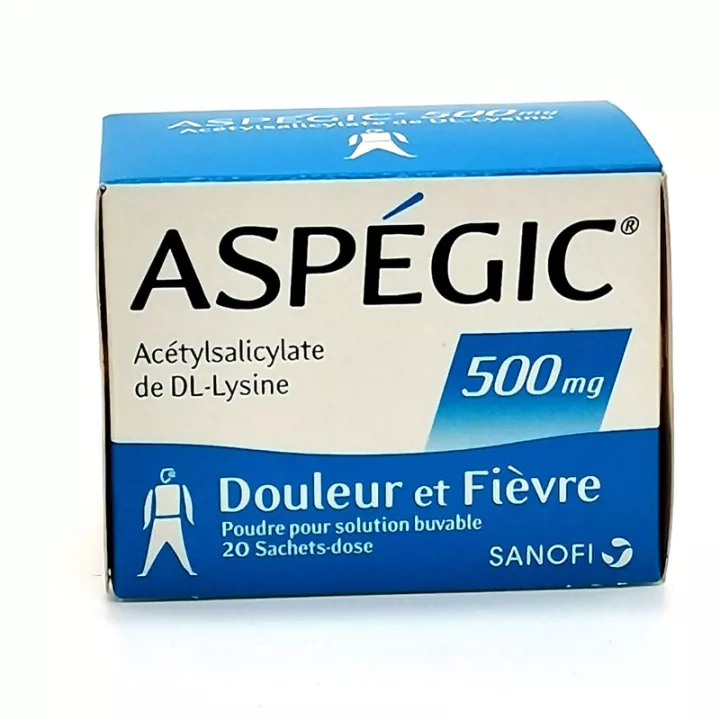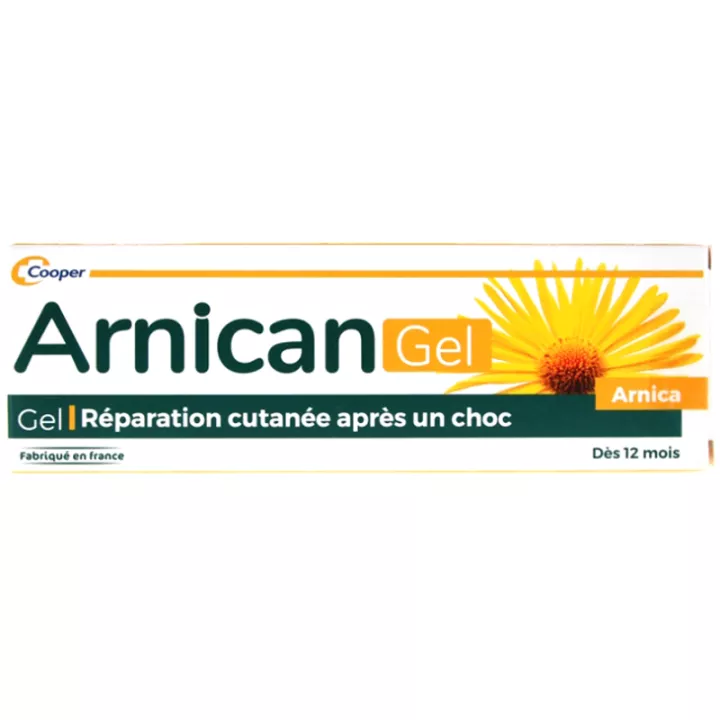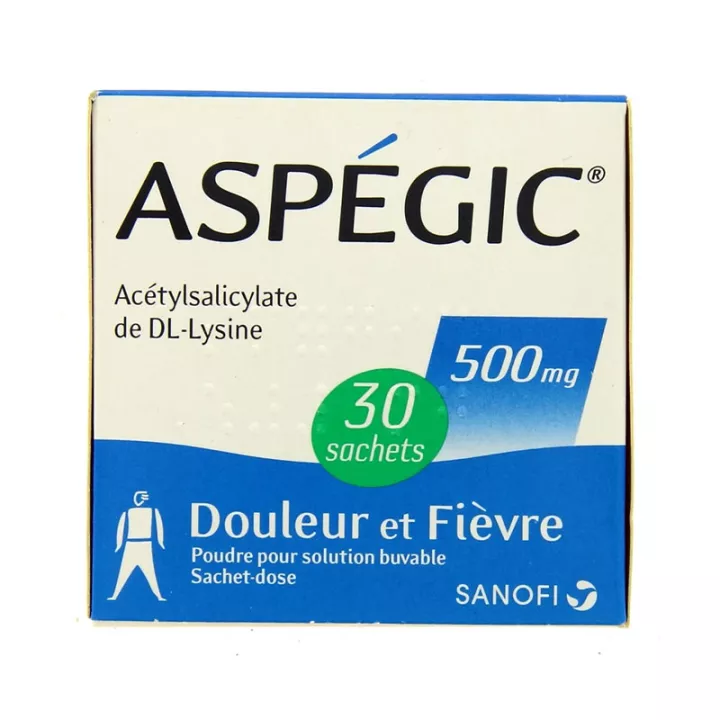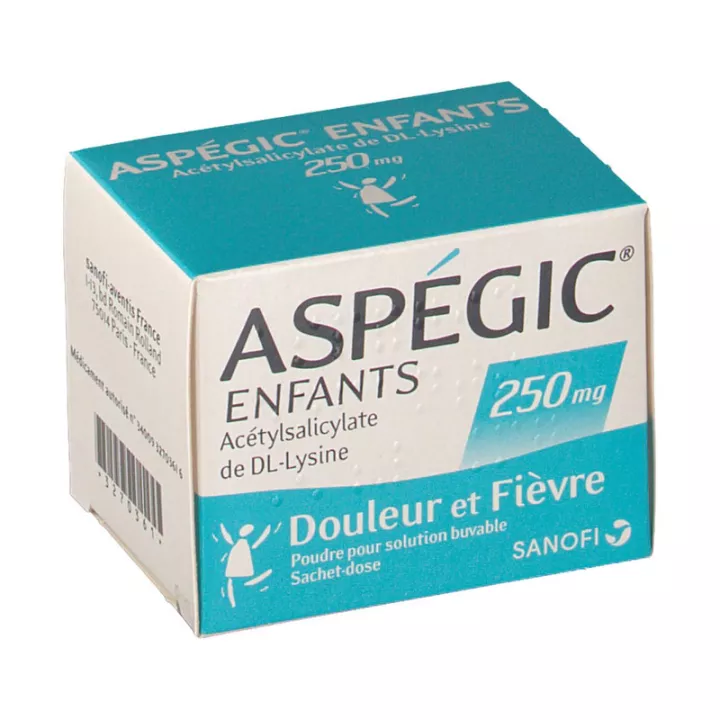NOTICE
ANSM - Last updated: 31/07/2017
Name of the medicinal product
ASPEGIC 500 mg powder for oral solution in sachet-dose
DL-Lysine Acetylsalicylate
framed
Please read this leaflet carefully before you start taking this medicine because it contains important information for you.
You should always take this medication exactly as prescribed in this leaflet or by your doctor or pharmacist.
· Keep this leaflet. You might need to read it again.
· Ask your pharmacist for advice or information.
· If you experience any of the side effects, talk to your doctor, or your pharmacist. This also applies to any side effects not mentioned in this leaflet. See section 4.
· You should contact your doctor if you experience no improvement or feel less well after 3 days.
Do not use this medication for children.
What is in this leaflet?
1. What is ASPEGIC 500 mg powder for oral solution in sachet-dose and in which cases it is used?
2. What should I tell you before taking ASPEGIC 500 mg powder for oral solution in a sachet-dose?
3. How to take ASPEGIC 500 mg powder for oral solution in sachet-dose?
4. What are the possible side effects?
5. How to store ASPEGIC 500 mg powder for oral solution in a sachet-dose?
6. Package contents and other information.
1. WHAT IS ASPEGIC 500 mg powder for oral solution in a sachet-dose AND WHAT IT IS USED FOR?
Pharmacotherapeutic group: OTHER ANALGESICS AND ANTIPYRETICS - ATC code: N02BA01.
This medicine contains aspirin. Aspirin belongs to the family of non-steroidal anti-inflammatory drugs.
Aspirin can be used to calm pain (analgesic), lower fever (antipyretic) and / or decrease inflammation.
ASPEGIC 500 mg powder for oral solution in sachet-dose contains 500 mg of aspirin.
He is used :
· In case of pain and / or fever such as headaches, flu-like conditions, dental pain, muscle pain in adults and children over 30 kg (approximately 9 to 15 years)
· In the treatment of certain rheumatic diseases in adults and children over 20 kg (about 6 years) after medical advice . Medical follow-up is necessary.
2. BEFORE YOU TAKE ASPEGIC 500 mg powder for oral solution in sachet-dose?
If your doctor has told you about an intolerance to some sugars, contact your doctor before taking this medicine.
Never take ASPEGIC 500 mg powder for oral solution in sachet-dose:
· If you are allergic (hypersensitive) to aspirin or any of the other ingredients of ASPEGIC 500 mg powder for oral solution in sachet-dose mentioned in section 6.
· If you are allergic (hypersensitive) to a drug of the same family as aspirin (non-steroidal anti-inflammatory drugs).
· If you have ever had asthma caused by taking aspirin or medication from the same family.
· If you are currently suffering from an ulcer of the stomach or duodenum.
· If you have any bleeding or if your doctor has identified a risk of bleeding in your area.
· If you have severe liver, kidney or heart disease.
· in pregnancy from the beginning of the 6th month (beyond 24 weeks of gestation) for doses of aspirin above 100 mg daily.
· If you are taking any other medicines, make sure that the combination with ASPEGIC 500 mg powder for oral solution in a sachet-dose is not contraindicated (see section '' Other medicines and ASPEGIC 500 mg powder for solution drinkable in sachet-dose '').
· If you have a mastocytosis (disease of the cells involved in allergic reactions) because there is a risk of severe allergic reactions.
IN CASE OF DOUBT, DO NOT HESITATE TO ASK FOR THE OPINION OF YOUR DOCTOR OR YOUR PHARMACIST.
Warnings and Precautions
Before using ASPEGIC 500 mg powder for oral solution in sachet-dose
ASPEGIC 500 mg powder for oral solution in sachet-dose is available without a prescription. However, you should consult your doctor before taking this medication if you:
· rheumatic diseases,
· inherited red blood cell disease, also known as G6PD deficiency (as high doses of aspirin may cause destruction of red blood cells),
· history of stomach or duodenal ulcer or inflammation of the stomach (gastritis),
· history of digestive bleeding (vomiting of blood or presence of blood in the stool),
· kidney or liver disease,
· abundant rules,
· if you are already taking another anti-inflammatory or anticoagulant treatment (see "Other medicines and ASPEGIC 500 mg powder for oral solution in sachet-dose" for more details)
· viral disease, in particular varicella or influenza-like syndrome: cases of Reye's syndrome (rare, very severe disease, associating mainly neurological disorders and liver damage) have been observed in children with viral disease and receiving aspirin.
If your child is less than one month old, you should first consult your doctor before using any medicine containing aspirin, regardless of dosage.
During treatment in children
This dosage is suitable for adults and children over 30 kg (from about 9 years) in case of pain or fever and for adults and children over 20 kg (from of about 6 years) in case of rheumatism. For children of different weights, there are other aspirin presentations with a more appropriate dosage. Do not hesitate to ask your doctor or pharmacist for advice.
During treatment, consult your doctor immediately if you have:
· (see section "Before using ASPEGIC 500 mg powder for oral solution in a sachet-dose"),
· bleeding or pain in the abdomen,
· an asthma attack. This may be a sign of an allergy to aspirin or a nonsteroidal anti-inflammatory drug.
If prolonged administration of high doses of analgesics is required, you should not increase the doses of ASPEGIC 500 mg powder for oral solution in a sachet-dose in case of headaches.
Regular use of pain-relieving drugs can lead to kidney complications.
If you have to undergo an operation
Aspirin increases the risk of bleeding even at very low doses, even when taking this drug is several days old.
Tell your doctor, surgeon, anesthesiologist or dentist about the use of this medication if you are undergoing any operation or intervention, even a minor one.
Blood tests
Tell your doctor if you need to take a blood test because aspirin can alter the level of uric acid in the blood.
Children and Youth
Not applicable.
Other medicines and ASPEGIC 500 mg powder for oral solution in sachet-dose

Never take large doses of ASPEGIC 500 mg powder for oral solution in a sachet-dose (see section '' Dosage ''):
· If you are taking doses greater than 20 mg / week of methotrexate (a drug used to treat certain cancers and rheumatism).
· If you are taking an oral anticoagulant (a medicine used to thin the blood) and you have a history of stomach ulcer or duodenal ulcer.
Unless otherwise advised by your doctor, you should not take:
· high doses of ASPEGIC 500 mg powder for oral solution in sachet-dose (see paragraph '' Dosage '') if you already take:
o an oral anticoagulant or a heparin (medicines used to thin the blood),
o a non-steroidal anti-inflammatory drug or a corticosteroid (drugs used to treat a rheumatic disease, pain or inflammation).
· low doses of ASPEGIC 500 mg powder for oral solution in sachet-dose (50 to 375 mg per day) if you are already taking:
o an oral anticoagulant (drug used to thin the blood) and has a history of stomach or duodenal ulcer.
· ASPEGIC 500 mg powder for oral solution in a sachet-dose regardless of dose, if you are already taking a medication containing:
o ticlopidine or clopidogrel (medicines used to thin the blood),
o benzbromarone or probenecid (drugs used to treat gout),
o levothyroxine (medication used to treat insufficiency of thyroid gland secretion),
o pemetrexed (medication to treat certain cancers),
o anagrelide (a drug used to decrease the number of platelets in the blood),
o defibrotide (a drug used to treat a condition in which blood vessels in the liver are damaged and obstructed by blood clots),
o acetazolamide (a drug used to reduce eye pressure or the level of carbon dioxide in the blood),
o ticagrelor (medication used to prevent platelet aggregation).
Varicella vaccine : It is recommended to wait 6 weeks after vaccination before taking this medication.
Inform your doctor or pharmacist if you are taking, have recently taken or may take any other medicines.
ASPEGIC 500 mg powder for oral solution in sachet-dose with food, drink and alcohol
Alcohol use should be avoided during treatment due to increased risk of gastrointestinal injury.
Pregnancy, breast-feeding and fertility
If you are pregnant or breastfeeding, think you may be pregnant or plan a pregnancy, ask your doctor or pharmacist for advice before taking any medicine.
Pregnancy
Low doses, up to 100 mg daily :
Throughout pregnancy, if necessary, your specialist physician may prescribe aspirin at very low doses (less than or equal to 100 mg per day) in exceptional circumstances requiring specialized monitoring. If this is the case, it is very important to strictly follow your doctor's prescription, without exceeding the prescribed doses, and NOT to take ANY other medicine containing aspirin (including non-prescription drugs).
For doses above 100 mg per day:
· from 0 to 5 months of pregnancy (up to the 24th week of amenorrhea), your doctor should not prescribe this medicine unless absolutely necessary. In this case, the dose should be as low as possible and the treatment time should be as short as possible.
· from 6 months to the end of pregnancy (from the 25th week of amenorrhea), this medication is contraindicated, you should NEVER take this medication because its effects on your child can have serious consequences even fatal, especially on a cardiopulmonary and renal plan and this even with a single intake.
If you are taking this medication while you are pregnant, talk to your obstetrician gynecologist immediately so that appropriate monitoring is available.
feeding
Aspirin passes into breast milk, this medication is not recommended during breast-feeding.
Ask your doctor or pharmacist for advice before taking any medicine.
Fertility
It has been proven that this drug can decrease female fertility by acting on ovulation. This effect is reversible upon discontinuation of treatment.
Sport
Not applicable.
Driving and using machines
Not applicable.
ASPEGIC 500 mg powder for oral solution in sachet-dose contains lactose.
This medication contains a sugar (lactose) which decomposes into galactose and glucose. Its use is not recommended in patients with galactose intolerance, Lapp lactase deficiency or glucose or galactose malabsorption syndrome (rare hereditary diseases).
If your doctor has already told you that you have an intolerance to some sugars, contact your doctor before taking this medicine.
3. HOW TO TAKE ASPEGIC 500 mg powder for oral solution in sachet-dose?
In case of pain, in case of fever :
This presentation is reserved for adults and children from 30 kg (approximately 9 to 15 years).
The dosage of aspirin depends on the weight of the child; the ages are mentioned for information purposes.
If you do not know the weight of the child, weigh it to give it the best dose.
Aspirin exists in many dosages, allowing the treatment to be adapted to the weight of each child.
The recommended daily dose of aspirin is approximately 60 mg / kg / day, divided into 4 or 6 doses, approximately 15 mg / kg every 6 hours or 10 mg / kg every 4 hours .
For children weighing 30 to 40 kg (approximately 9 to 13 years), the dosage is 1 sachet per dose, to be renewed if necessary after 6 hours, without exceeding 4 sachets per day .
For children weighing 41 to 50 kg (approximately 12 to 15 years), the dosage is 1 sachet per dose, to be renewed if necessary after 4 hours, without exceeding 6 sachets per day .
For adults and children weighing more than 50 kg (from about 15 years):
· the maximum recommended daily dose is 3 g of aspirin, ie 6 sachets per day.
· The usual dosage is from 1 sachet to 500 mg, to be renewed if necessary after 4 hours minimum.
· In case of severe pain or fever , 2 sachets to 500 mg, to be renewed if necessary after 4 hours minimum, without exceeding 6 sachets per day.
For the elderly :
· the recommended maximum daily dose is 2 g of aspirin, ie 4 sachets per day.
· The usual dosage is from 1 sachet to 500 mg, to be renewed if necessary after 4 hours minimum.
· In more severe pain or fever , 2 sachets at 500 mg, to be renewed if necessary after 4 hours minimum, not to exceed 4 sachets per day.
In case of rheumatic diseases, after medical advice :
This presentation is reserved for adults and children over 20 kg (about 6 years).
Your doctor will tell you how much to take.
Method and route of administration
This medication is used orally.
Pour the contents of the sachet into a glass and add a small amount of drink (eg water, milk, fruit juice).
Frequency of Administration
Taken at regular intervals, avoid peaks of fever or pain.
In adults : catches should be regularly spaced at least 4 hours apart.
In children : catches should be regularly spaced, including at night , preferably 6 hours and at least 4 hours.
In case of rheumatic affections: the spacing between catches must be at least 4 hours.
Duration of treatment
|
The duration of treatment is limited:
· at 5 days in case of pain,
· at 3 days in case of fever.
In case of rheumatic diseases, your doctor will tell you how long you should take this medication.
|
Stop treatment and see your doctor immediately:
· if the pain persists more than 5 days or the fever lasts more than 3 days,
· if the pain or fever get worse,
· if you find that the treatment is not effective enough,
· or if any new signs occur (eg stiff neck, diarrhea, vomiting ...).
If you take more ASPEGIC 500 mg powder for oral solution in a sachet-dose than you should:
Consult your doctor immediately (especially if it is a child who has taken this medication accidentally).
Overdose can be fatal, especially in children. The main symptoms of poisoning are: ringing in the ears, a feeling of hearing loss, headaches, dizziness, or even more severe fever, severe hypoglycemia (lowering of sugar levels in the blood), rapid fall in blood pressure, accelerated breathing and loss of consciousness (coma).
If these signs occur, you should immediately stop treatment and go to a hospital for treatment.
Lung edema not associated with heart failure can occur in acute and chronic overdose with aspirin (see 4. What are the side effects?). This edema can be fatal in case of overdose.
If you forget to take ASPEGIC 500 mg powder for oral solution in sachet-dose:
Do not take a double dose to make up for the single dose that you have forgotten to take.
If you stop taking ASPEGIC 500 mg powder for oral solution in sachet-dose:
Not applicable.
4. WHAT ARE POSSIBLE SIDE EFFECTS?
Like all medicines, ASPEGIC 500 mg powder for oral solution in sachet-dose may cause side effects, although not everybody gets them.
· Ulceration of the esophagus, stomach, and intestine, perforation of digestive ulcer, perforation of the intestine.
These reactions may or may not be associated with visible or non-visible gastrointestinal bleeding (black stools, stool blood, or oral rejection), regardless of the dose of aspirin, and in patients with or without warning signs or of serious gastrointestinal history. High doses increase the risk of bleeding.
· Life-threatening bleeding (hemorrhage)
· Cerebral haemorrhage (bleeding in the brain) that can be life-threatening, especially in the elderly. If this happens, tell your doctor immediately.
· Decrease in the number of platelets in the blood.
· Destruction of red blood cells (haemolytic anemia) in patients with G6PD deficiency.
· Abnormally low levels of certain blood cells (pancytopenia, bicytopenia, aplastic anemia), depletion of blood cell production (medullary insufficiency), abnormally low levels of certain white blood cells that can lead to serious infections (leucopenia, neutropenia, agranulocytosis).
· Allergic reaction: pimples and / or redness on the skin, hives, abrupt swelling of the face or neck, which can lead to difficulty breathing (angioedema), abrupt malaise with a significant drop in blood pressure (anaphylactic shock).
· Rash in round red patches with itching and burning sensation, leaving colored spots and appearing in the same places when the drug is resumed.
· Ringing in the ears, sensation of hearing loss, headache and dizziness. This may be an overdose,
· Reye Syndrome (onset of consciousness or behavioral disorder and vomiting) in a child with viral disease and receiving aspirin (see section 2 "Warnings and Precautions").
· Inflammation of blood vessels may be associated with involvement of joints, kidney, skin and gastrointestinal tract.
· Increased liver enzymes, liver damage (mainly liver cells).
· Chronic liver disease (chronic hepatitis),
· Acute inflammation of the pancreas during an allergic reaction related to acetylsalicylic acid.
· Edema (swelling due to fluid build-up in tissues) if you are taking high doses of ASPEGIC 500 mg powder for oral solution in a sachet-dose .
· Lung edema not related to heart failure in long-term use and in the context of an allergic reaction to aspirin.
· Localized pain in the chest that can radiate to the left shoulder and jaw of allergic origin (Kounis syndrome).
· Kidney disease (renal failure).
In all cases, stop treatment immediately and seek prompt medical attention.
Other possible side effects:
· Abdominal pain.
· Bleeding (nose, gums), small red spots on the skin (purpura).
· Inflammation of the esophagus, stomach, duodenum and colon.
· Presence of blood in the sperm (hematospermia).
In these cases, you should consult your doctor.
Declaration of side effects
If you experience any side effects, talk to your doctor or pharmacist. This also applies to any side effects not mentioned in this leaflet. You can also report adverse reactions directly via the national reporting system: National Agency for the Safety of Medicines and Health Products (ANSM) and network of Regional Centers of Pharmacovigilance
By reporting adverse reactions, you are helping to provide more information about the safety of the drug.
5. HOW TO STORE ASPEGIC 500 mg powder for oral solution in a sachet-dose?
Keep this medicine out of the reach and sight of children.
Do not use this medicine after the expiry date which is stated on the carton. The expiry date refers to the last day of that month.
Store at a temperature not exceeding 25 ° C and keep the sachets in the outer carton, protected from moisture.
Do not throw any medicines into drains or rubbish. Ask your pharmacist to remove any medications you are no longer using. These measures will help protect the environment.
6. PACKAGE CONTENTS AND OTHER INFORMATION
What ASPEGIC 500 mg contains, powder for oral solution in sachet-dose
· The active substances are:
DL-Lysine Acetylsalicylate ............................................. .............................................. 900 mg
(Corresponding amount of acetylsalicylic acid ............................................ ............ 500 mg)
For a sachet-dose.
· The other components are: glycine, mandarin aroma, ammonium glycyrrhizate.
What is ASPEGIC 500 mg powder for oral solution in sachet-dose and contents of the pack
Powder for oral solution. Box of 10, 15, 20, 30 and 50 of sachets-dosages.
Not all pack sizes may be marketed.
Marketing Authorization Holder
SANOFI AVENTIS FRANCE
82 AVENUE RASPAIL
94250 GENTILLY
Marketing Authorization Operator
SANOFI AVENTIS FRANCE
82 AVENUE RASPAIL
94250 GENTILLY
Maker
SANOFI WINTHROP INDUSTRIE
196 AVENUE DU MARECHAL JUNE
45200 AMILLY
Names of the medicinal product in the Member States of the European Economic Area
Not applicable.
The last date on which this leaflet was revised is:
{month YYYY}.
Other
Detailed information on this medicine is available on the ANSM website (France).
Health Education Council:
WHAT TO DO IN CASE OF FEVER
A child is considered to have a fever when the temperature exceeds 38 ° C.
Fever is a natural and frequent reaction of the body to fight infections, it is very rare that it is the only sign of a serious illness or that it leads to complications.
What has to be done :
Generally it is only above 38.5 ° C that treatment is envisaged; however this should not be systematic, especially if the fever is well supported by the child.
1) Before giving a medication for fever, always:
· remove blankets and superfluous layers of clothing,
· present often to drink to the child,
· do not overheat the room (about 18-20 ° C).
These 3 simple measures are sufficient in many cases to lower the fever.
Other measures exist (warm baths, ice packs, wet wraps ...), they are not necessarily more effective and will be considered only if they do not increase the child's evil being.
2) Secondly, the child may be given a fever medication (medication called antipyretic).
Read carefully the paragraph "What to know before taking ASPEGIC 500 mg powder for oral solution in a sachet-dose".
How should a fever medicine be used?
· respect the doses and delays between catches,
· give only one medication (do not combine or alter medications differently without medical advice),
· check that the child does not otherwise receive the same medicine (syrup, sachets, suppositories ...) or under another brand name.
If the fever persists for several days, if new signs (in particular stiffness of the neck, diarrhea, vomiting ...) or indicating that the fever is badly supported (child slaughtered, losing its reactivity ...), you must not do not hesitate to consult a doctor.
WHAT TO DO IF PAINFUL
You should consult a doctor:
· if you do not feel any improvement after 5 days of treatment,
· if the pains return regularly,
· if accompanied by fever,
· if they awaken your child at night.










